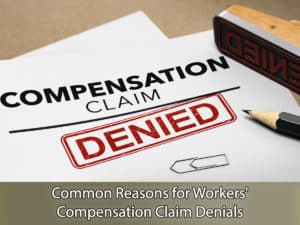Potential Reasons for California Workers’ Comp Claim Denials
Workers’ compensation is an essential safety net for employees who suffer injuries or illnesses due to their work environment. In California, this system aims to provide medical benefits and compensate for lost wages without the need for lengthy litigation. However, not all claims are straightforwardly accepted. Denials can occur for a variety of reasons, creating challenges for those who are already dealing with the stress of injuries and potential financial hardships. Recognizing the common reasons for these denials can significantly enhance an employee’s ability to navigate the claims process effectively.
Understanding Workers’ Compensation in California
California’s workers’ compensation system operates under a no-fault principle, meaning employees do not need to prove their employer’s fault to receive benefits. This system is designed to ensure quick and efficient treatment and compensation for injured workers. Despite this intention, the process of filing and getting a claim approved can be complicated by stringent requirements and meticulous scrutiny by insurers. Employees must meet specific criteria regarding reporting times, documentation, and evidence of injury causality related to their work. Understanding these requirements is the first step towards ensuring that claims are not rejected on technical grounds.

Common Reasons for Workers’ Compensation Claim Denials
Common Reasons for Workers’ Compensation Claim Denials
Incomplete Claim Forms
One of the most frequent reasons for a claim denial is the submission of incomplete claim forms. Accurate and comprehensive completion of required paperwork is crucial. Small oversights such as missing dates, incomplete medical information, or insufficient employer details can lead to claim rejections. It is advisable for claimants to review their forms with a legal expert or a seasoned workers’ compensation attorney to ensure all information is correctly and thoroughly provided.
Late Reporting of the Injury
Timely reporting of work-related injuries is critical in the workers’ compensation claim process. California law stipulates that injuries must be reported to employers within 30 days of the occurrence or discovery. Late reporting not only complicates the verification of the injury as job-related but also can be seen as an indicator of a fraudulent claim, leading to denial by insurance providers.
Dispute Over Whether the Injury is Work-Related
Employers or their insurance carriers often deny claims by disputing the assertion that the injury occurred in the course of employment. This is particularly common in cases involving repetitive stress injuries or conditions that develop over time, such as certain types of joint or back issues. Providing clear and detailed medical records, statements from witnesses, and expert testimonies can help substantiate the claim that an injury is work-related.
Lack of Medical Evidence
Comprehensive medical documentation is foundational to a successful workers’ compensation claim. Claims often fail when there is insufficient medical evidence to support the injury claims or the extent of the injuries. Detailed medical reports from attending physicians, including diagnosis, treatment plans, and prognoses, are essential to prove the legitimacy of a claim. Without robust medical documentation, the insurance carriers might contest the severity of the injury or its relation to the workplace incident.
Steps to Take After a Workers’ Comp Claim Denial
After receiving a denial, it’s crucial to act swiftly to address any issues. The first step is to understand the specific reasons for the denial, which are typically outlined in the denial letter from the insurance company. Once these reasons are understood, collecting additional evidence or correcting errors in the initial submission becomes imperative. Consulting with a knowledgeable attorney who specializes in workers’ compensation can provide guidance on how to gather necessary documentation and effectively present your case during the appeal process.

Preventing Workers’ Compensation Claim Denials
Preventing Workers’ Compensation Claim Denials
To prevent workers’ compensation claim denials, it is crucial to understand and adhere to all procedural requirements from the outset. This includes timely reporting of injuries, complete and accurate documentation of all aspects of your claim, and ensuring all medical reports and evidence are submitted correctly. Education on workplace rights and proactive communication with your employer about workplace safety and injury reporting procedures can also mitigate risks of denials.
How Napolin Accident Injury Lawyer Can Help With Your Workers’ Comp Claim
Napolin Accident Injury Lawyer has a proven track record of assisting workers throughout California in navigating the complexities of workers’ compensation claims. With a deep understanding of the nuances of California workers’ compensation law, our firm can assess your case, guide you through the appeal process, and help correct procedural mistakes or gather additional evidence required to overturn a denial. Our goal is to ensure that you receive the full benefits you are entitled to under the law.

Potential Reasons for California Workers’ Comp Claim Denials
Potential Reasons for California Workers’ Comp Claim Denials
Dealing with a denied workers’ compensation claim can be a daunting challenge. If you find yourself in this situation, do not hesitate to reach out to Napolin Accident Injury Lawyer. Our extensive experience in litigating workers’ compensation claims ensures that we can offer robust support and advocacy. Call us at (866)-NAPOLIN for a free consultation, and let us help you secure the benefits you deserve, guiding you every step of the way through the appeal process.
- Medical Liens in California Personal Injury Claims Explained - April 27, 2024
- Essential Tips for Bicycle Injury Prevention in California - April 27, 2024
- Understanding Who is Exempt from Workers’ Compensation in California - April 27, 2024
